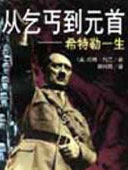Chapter 1 foreword
Perhaps, Adolf Hitler was one of the greatest figures who shook history in the 20th century.Surely no one in our time has destroyed so many souls and provoked so much hatred.He commanded widespread respect and was the hope and ideal of millions.In the thirty-plus years since his death, neither enemies nor friends have much changed their opinion of him.Today, we view other leaders of his time—Roosevelt, Churchill, Mussolini, Stalin—differently and more objectively, but the image of Hitler remains the same.To some of Hitler's followers, he was a hero, a failed messiah; to others, he remained a lunatic, a political and military fool, and a hopeless murderer.Some of his achievements were purely achieved through criminal means.
Like many people, my own life was destroyed by Hitler. When I wrote about him, I tried my best to suppress my feelings and write about him as an ancient man from a hundred years ago.I met many people who knew Hitler deeply—worshipers and detractors.Many people have talked about their unfortunate past with eloquence and at length.The hesitation of years ago when it comes to the Führer and his actions, for fear of distorting his views, is no longer present.I worked with Hitler's adjutants (Puckamel, Bello, Engel, Genscher, Wenscher and Schulz), secretaries (Traudl Jung, Gerda Christian), pilots (Powell Er), doctors (Giesing, Hasselbach), confidant officers (Skorzeny, Rudel), confidant architects (Speer, Gessler), first press officers (Hanfsch Tangel), military leaders (Manstein, Milch, Dönitz, Mantefort, Warimund) and the women he most admired (Rini Reifensdahl, Mrs. Troost , Mrs. Helena Hanfstangel) and others met no less than 250 times.Dozens of these interviews were recorded, and these tapes are now preserved in the Library of Congress.The conversations during the meeting have been included in this book, and all of them have read the relevant chapters.They not only made revisions, but also put forward many useful suggestions.
To unravel the Hitler mystery, I also used numerous documents, reports, and monographs: archives of the U.S. Army's counterintelligence service, including records of an agent's meeting with Hitler's sister Paula; unpublished documents from the National Archives , for example, the secret report on Hitler's psychosis in 1918; unpublished documents from the British Government Archives; the newly discovered correspondence between Goering and Nagleri between 1924 and 1925, which shed light on Nazi-Fascist relations. new evidence; Himmler's secret speeches; unpublished diaries, records, memoirs, etc., including the recollections of Hitler's youngest secretary, Traudel Jung, which made quite a few revelations.
My book has no theme, and if there are any conclusions in the book, they have been drawn in the process of writing, the most significant of which is perhaps this: Hitler was much more complicated and contradictory than I imagined.One of Graham Greene's characters said, "The greatest saints have ever been those who have a supernatural ability to do evil, and the most vicious people can not help but sometimes have a little holy." With Paradise denied, Hitler chose Hell ——To be honest, he knew that there was a difference between the two.Tormented by dreams of wiping out the Jews from the Continent, he remained in the end nothing more than a knight of the swastika, a perverted archangel; a mixed god of Prometheus and Lyusihu.

